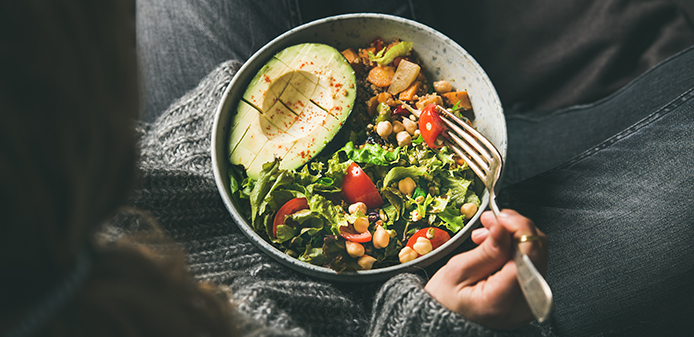How to Eat

With increasing research into food, health and weight it’s becoming clear that food is so much more than protein, carbs, fats and calories. And it’s not just what we eat that makes a difference but when we eat and how we eat.
A recent study found links between daily eating patterns and mortality risk. The investigators analysed data from more than 24,000 American adults aged 40 years and above between 1999 and 2014 (1).
The research found that:
Eating only one meal per day is associated with an increased risk of mortality in this cohort of American adults.
Skipping breakfast is associated with higher risk of death from cardiovascular disease and missing lunch or dinner is associated with a higher risk of mortality from any cause.
This may be because skipping meals usually leads to ingesting a larger energy meal at one time, which can burden glucose metabolism and lead to metabolic deterioration.
Eating meals too close together is associated with an increased risk of death from all causes. Having 4.6-5.5 hours between meals seems to be associated with better health outcomes.
The researchers recommend eating 2 or 3 meals a day spread out over the day.
The research found a number of common characteristics among participants eating fewer than three meals per day (around 40% of respondents). They were more likely to be younger, male, non-Hispanic Black, have less education and lower family income, smoke, drink more alcohol, be food insecure, and eat less nutritious food, eat more snacks, and have a lower energy intake overall although the results were adjusted for smoking, alcohol use, physical activity, energy intake and diet quality.
Meal Sequencing
Meal sequencing refers to the order in which the macronutrients in a meal are eaten. Macronutrients are protein, fats and carbohydrates, as opposed to micro-nutrients which are vitamins and minerals.
It is suggested that it may be beneficial to eat protein and/or fat before eating carbohydrates. This promotes the secretion of glucagon-like peptide-1 (GLP-1) from the gut as well as improving secretions of insulin and glucagon and delaying gastric emptying. GLP-1 suppresses the appetite by acting on the hypothalamus via the vagus nerve (2). The delayed gastric emptying means you feel full for longer.
That said, eating foods rich in saturated fat from animal products, before carbohydrate increases secretions of GLP-1 as well as another chemical that promotes energy storage in fat tissue and may lead to weight gain in the long term.
Preload the Fibre
Another useful thing to know is that dietary fibre intake before carbohydrate intake significantly reduces postprandial glucose levels and may help with weight loss.
So, to maximise the benefits to blood sugar and to avoid weight gain try eating a combination of fibre with protein and/or fat before eating carbohydrates (2). This is a useful and practical strategy for anyone with blood sugar problems, type 2 diabetes or a tendency to gain weight.
And if you’ve read the blog post 10 Surprising Weight Loss Friends you’ll know that eating nuts before a meal does indeed aid weight loss. This may be because nuts contain protein, fibre and beneficial fats.
Load Up on Breakfast
Many studies emphasise that the timing of food intake, as well as what is eaten, may have a significant role in weight gain and associated problems. For example studies show that dieters wanting to lose weight who eat a high calorie breakfast will experience significantly greater weight loss than those who eat a high calorie evening meal regardless of how many calories are eaten in the course of the day (3).
Other researchers looked at information from over 50 000 participants in the Adventist Health Study. They found that there were 2 factors associated with a higher Body Mass Index (BMI). These were: eating more than 3 meals or snacks a day and having the largest meal of the day in the evening (4).
So breakfast like a King is certainly a maxim worth sticking to. For ideas about what the new kids on the block are food wise see the blogpost New Year, New Foods. And for some ideas of foods that may aid weight loss see blog post 10 Surprising Weight Loss Friends.
References
- 1.J Acad Nutr Diet. 2022 Aug 11;S2212-2672(22)00874-7 Meal Skipping and Shorter Meal Intervals Are Associated with Increased Risk of All-Cause and Cardiovascular Disease Mortality among US Adults. Yangbo Sun et al.
- 2. Nutrients. 2020 Aug 19;12(9):E2502. A Review of Recent Findings on Meal Sequence: An Attractive Dietary Approach to Prevention and Management of Type 2 Diabetes. Kubota S et al.
- 3. Physiol Behav. 2014 Jul;134:44-50. Timing of food intake and obesity: a novel association. Garaulet M et al.
- 4. Journal of Nutrition, 2017; jn244749. Meal Frequency and Timing Are Associated with Changes in Body Mass Index in Adventist Health Study 2. Kahleova H, Lloren JI, Mashchak A et al.